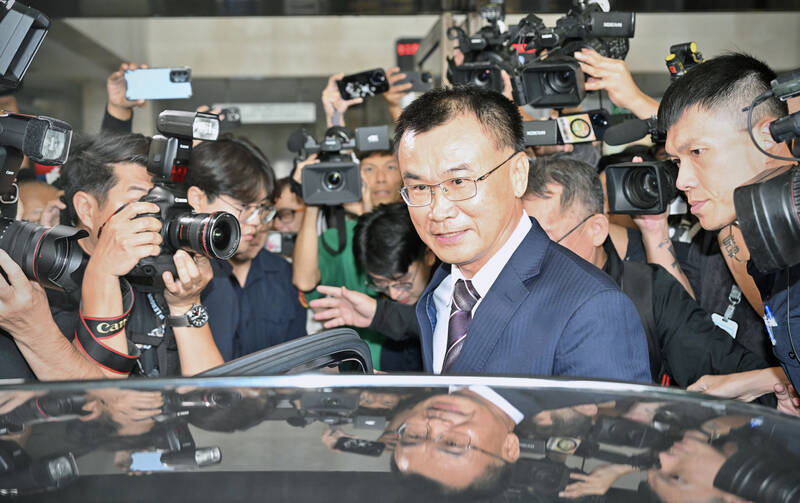Three people implicated in a controversial scheme to import eggs during a domestic shortage in 2022 were released without bail after being questioned by prosecutors.
The three people questioned, all listed as possible defendants in the case, are former minister of agriculture Chen Chi-chung (陳吉仲), former National Animal Industry Foundation (NAIF) president Lin Tsung-hsien (林聰賢) and Minister of Agriculture Chen Junne-jih (陳駿季).
Prosecutors did not specify why the two Chens were named as possible suspects for contravening the Anti-Corruption Act (貪污治罪條例), although Chen Chi-chung was in office in 2022 when the alleged illegality occurred.

Photo: Lo Pei-de, Taipei Times
The case originated in 2022 when Taiwan faced an egg shortage, prompting the then-Council of Agriculture (COA, now the Ministry of Agriculture) to import eggs from other countries.
The Control Yuan, the government watchdog, said the NAIF was defrauded of more than NT$100 million (US$3.12 million) after being entrusted by the COA in 2022 to handle the emergency egg supply issue.
Japan was one of the countries from which Taiwan wanted to import eggs, and the NAIF commissioned Wu Yu-fei (吳諭非), a food company representative familiar with trade with Japan, coordinated the egg imports and specified Brilliance Biotechnology as the importer, before Chin Yu-chiao (秦語喬), Wu’s mother, founded Ultra Source to handle the imports, the Control Yuan said.
As a result, the NAIF contracted Brilliance Biotechnology to import eggs from Japan from March to May 2022, followed by procuring more than 25 million eggs from Ultra Source between August and November that the company had stocked after importing them from Japan, the Control Yuan report said.
The Control Yuan report said the NAIF purchased eggs from Ultra Source before the company was even registered.
The report also said that the NAIF failed to inspect the quality and quantity of the imported eggs upon delivery, and retroactively filled out contract paperwork.
The report also cited prosecutors as finding that Ultra Source repeatedly forged quotations and inflated import charges to defraud the government-funded NAIF of NT$100 million.
When the case came to light, the choice of Ultra Source was particularly scrutinized because it had no record of previous egg imports and was established with only NT$500,000 of paid-in capital.
The Taipei District Prosecutors Office last month in collaboration with other investigation units raided 14 locations and summoned eight people and three other witnesses for questioning.
After questioning, Chin, Lin I-lung (林宜龍), head of Brilliance Biotechnology; Wu Chun-ta (吳俊達), then a specialist at the foundation; and Lin Chang-hsien (林昌憲), an employee at Brilliance Biotechnology, were released on bail of NT$2 million, NT$1 million, NT$500,000 and NT$300,000 respectively.
Prosecutors have also sought to question Wu Yu-fei, but she has not answered the summons.

Chinese Nationalist Party (KMT) Chairman Eric Chu (朱立倫), spokeswoman Yang Chih-yu (楊智伃) and Legislator Hsieh Lung-chieh (謝龍介) would be summoned by police for questioning for leading an illegal assembly on Thursday evening last week, Minister of the Interior Liu Shyh-fang (劉世芳) said today. The three KMT officials led an assembly outside the Taipei City Prosecutors’ Office, a restricted area where public assembly is not allowed, protesting the questioning of several KMT staff and searches of KMT headquarters and offices in a recall petition forgery case. Chu, Yang and Hsieh are all suspected of contravening the Assembly and Parade Act (集會遊行法) by holding

PRAISE: Japanese visitor Takashi Kubota said the Taiwanese temple architecture images showcased in the AI Art Gallery were the most impressive displays he saw Taiwan does not have an official pavilion at the World Expo in Osaka, Japan, because of its diplomatic predicament, but the government-backed Tech World pavilion is drawing interest with its unique recreations of works by Taiwanese artists. The pavilion features an artificial intelligence (AI)-based art gallery showcasing works of famous Taiwanese artists from the Japanese colonial period using innovative technologies. Among its main simulated displays are Eastern gouache paintings by Chen Chin (陳進), Lin Yu-shan (林玉山) and Kuo Hsueh-hu (郭雪湖), who were the three young Taiwanese painters selected for the East Asian Painting exhibition in 1927. Gouache is a water-based

Taiwan would welcome the return of Honduras as a diplomatic ally if its next president decides to make such a move, Minister of Foreign Affairs Lin Chia-lung (林佳龍) said yesterday. “Of course, we would welcome Honduras if they want to restore diplomatic ties with Taiwan after their elections,” Lin said at a meeting of the legislature’s Foreign Affairs and National Defense Committee, when asked to comment on statements made by two of the three Honduran presidential candidates during the presidential campaign in the Central American country. Taiwan is paying close attention to the region as a whole in the wake of a

OFF-TARGET: More than 30,000 participants were expected to take part in the Games next month, but only 6,550 foreign and 19,400 Taiwanese athletes have registered Taipei city councilors yesterday blasted the organizers of next month’s World Masters Games over sudden timetable and venue changes, which they said have caused thousands of participants to back out of the international sporting event, among other organizational issues. They also cited visa delays and political interference by China as reasons many foreign athletes are requesting refunds for the event, to be held from May 17 to 30. Jointly organized by the Taipei and New Taipei City governments, the games have been rocked by numerous controversies since preparations began in 2020. Taipei City Councilor Lin Yen-feng (林延鳳) said yesterday that new measures by